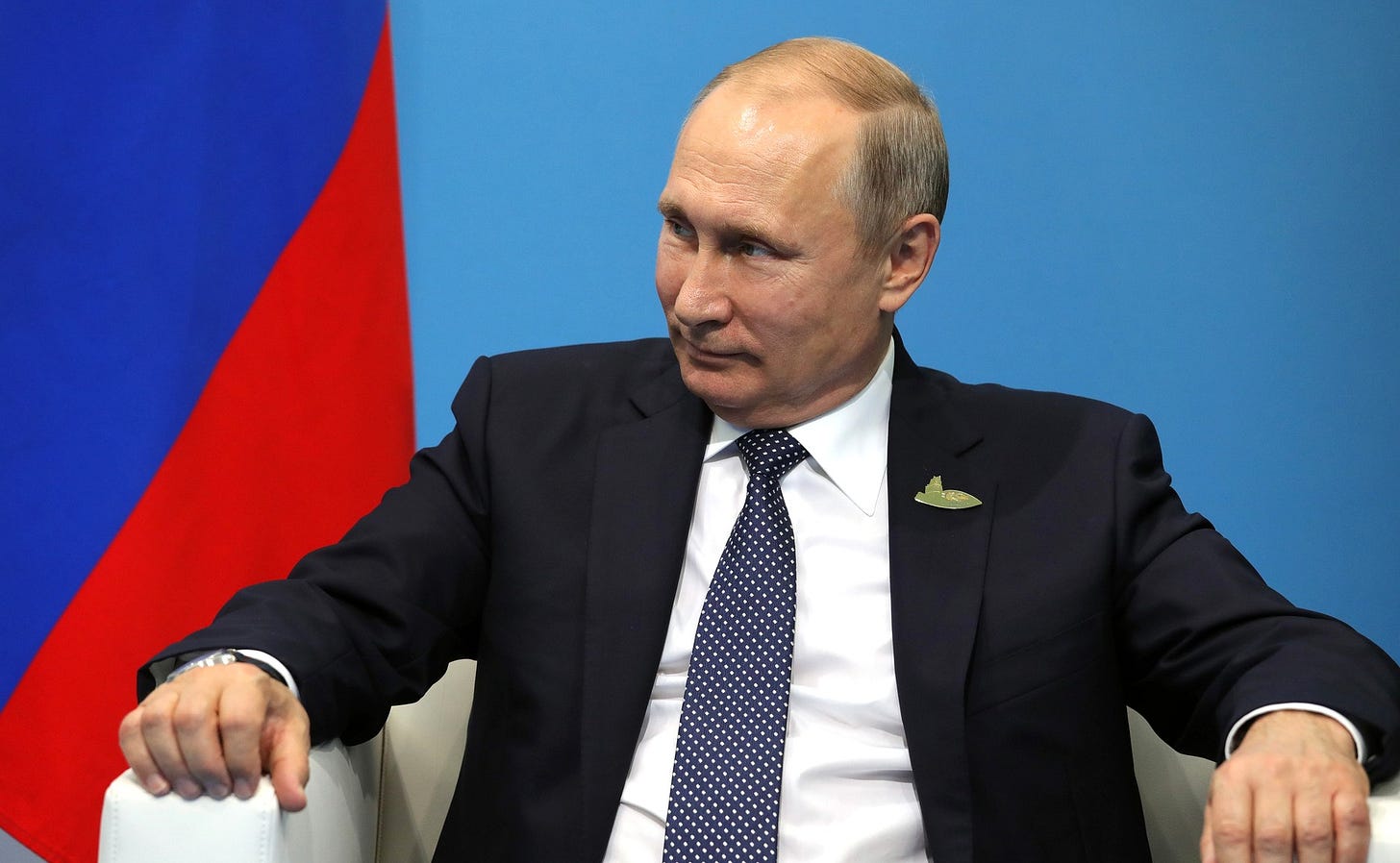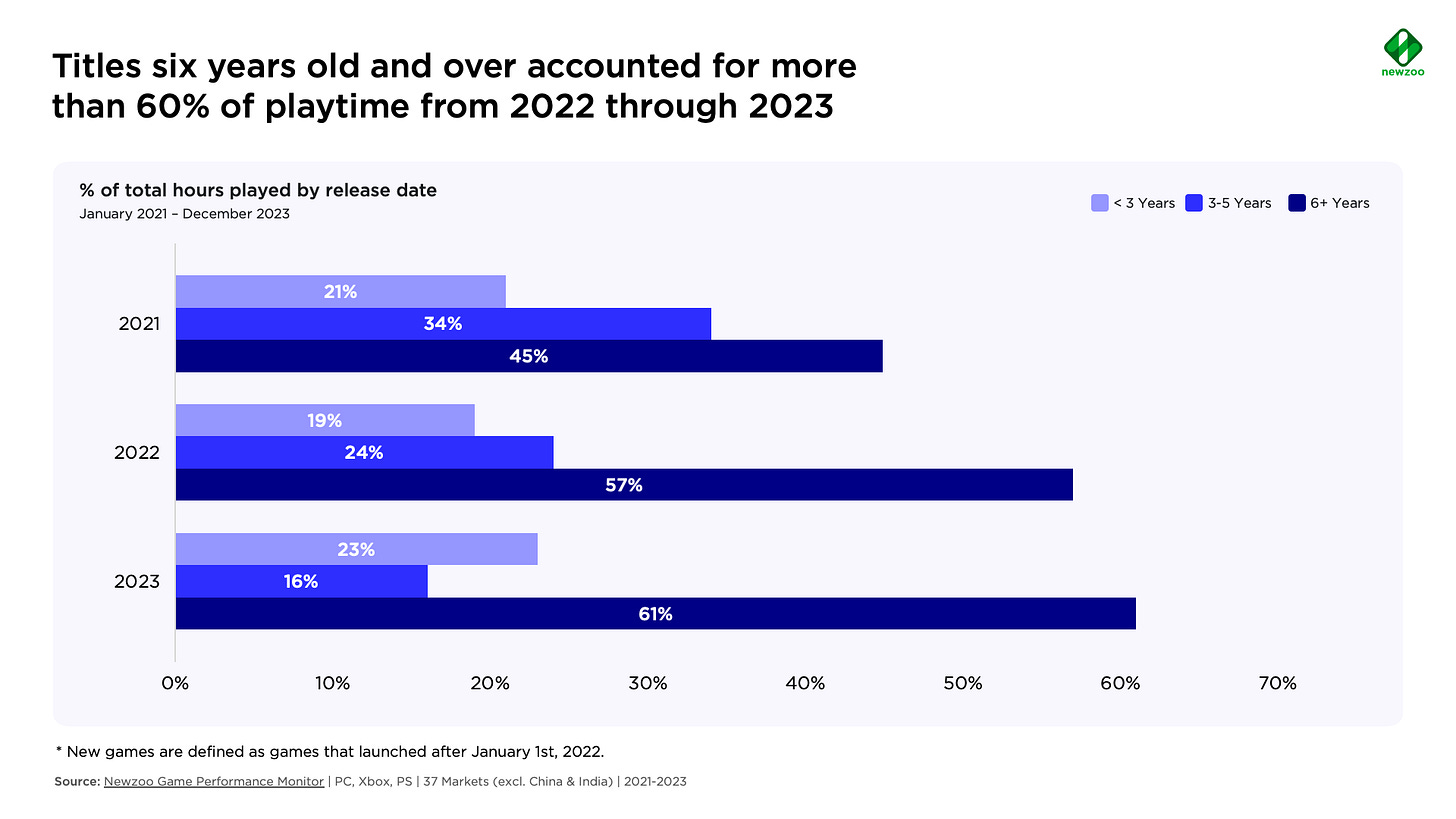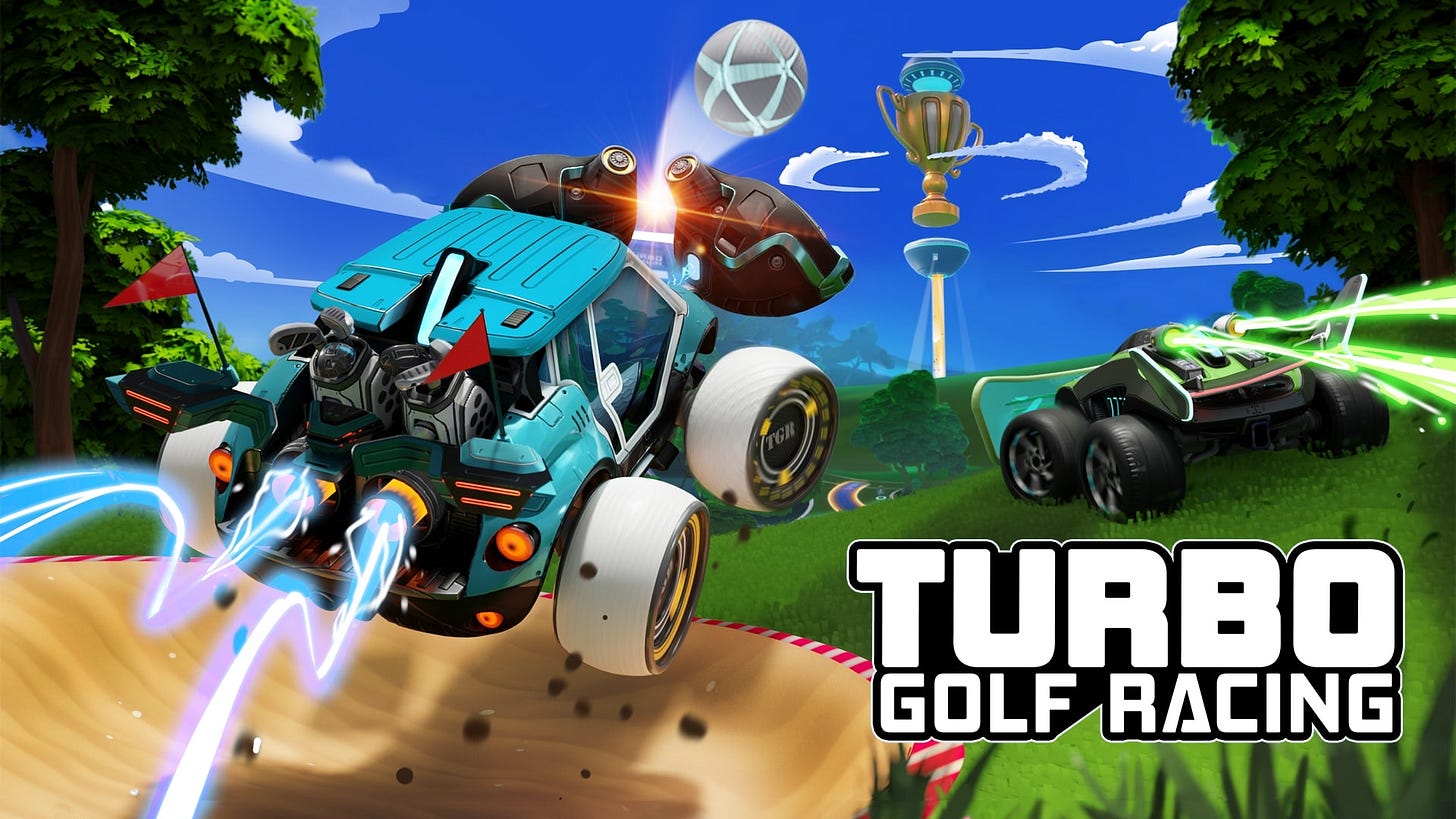Vladimir Putin’s Video Games Console: Video Games Industry Memo, 04/04/2024
Taking the console wars up a notch or two
Vladimir Putin signs off plans to explore the creation of a Russian games console
61% of playtime on console and PC happens in older games, according to Newzoo
Turbo Golf Racing tees off a quiet week of game releases
Good morning VGIM readers,
I’m back! Lucy James did a magnificent job guest editing VGIM last week but she has kindly passed me back the reins until the next time I decide to bugger off on holiday (Lucy, call me in June).
Anyway, the exciting news is that it’s just one week until I see you all - and I expect to see every single one of you - at the London Developer Conference.
The final line up for the event has been confirmed and we’ve got speakers from the likes of The Guardian, CCP Games, Roblox, Newzoo, Sharkmob, ustwo games, AI and Games, Politico, Ukie, the BFI, nDreams and Games Industry Biz taking to the stage.
And, boy, are these people tackling the big topics. We’ll be careering straight into the whopping issues of the day including how AI is changing game development, exploring the unusual ways that games communities are transforming skills in real life and even how a general election might affect the UK games biz. Phwoar.
If you’ve bought a ticket already, well done. If you haven’t, make sure to buy one here using the promo code NETWORKN10, provided by my chums at Network N, to get 10% off.
But enough of reading about flogging conference tickets to games industry professionals. How does reading a piece about flogging Russian video games consoles to Russian citizens sound instead?

The big read - Vladimir Putin’s Video Games Console
On Thursday 25th January 2024, Vladimir Putin chaired a meeting regarding the socio-economic development of the Kaliningrad region. Two months after the chat drew to its conclusion, the Kremlin published nine orders - with Presidential sign off - for officials to put into action to keep Russia’s Baltic presence on the up.
For the most part, the orders covered areas that VGIM, respectfully, leaves to better qualified people. After all, I don’t think I can provide much insight into the benefits of constructing a new main taxiway at Kaliningrad airport or whether its “Planet Ocean” museum really would benefit from a brand spanking new third building within the wider complex.
But there’s one thing I do know about and that’s video games. So I was naturally intrigued to discover via Video Games Chronicle that, nestled gently between an instruction about tweaking federal budget allocations and preparing proposals aimed at increasing electric car uptake, Putin signed off an interesting order aimed at supporting Russia’s games industry.
Order 1d committed Mikhail Mishustin, the Prime Minister of the country no less, to explore whether Russia can create its own homegrown games consoles, as well as an operating system and cloud games service, by 15th June 2024.
But why is Russia doing this? The answer, on the face of it, is an attempt to reinvigorate the country’s games industry after a challenging couple of years caused in no small part by its decision to engage in *checks note passed to him by a stern looking FSB officer* a special operation within Ukraine.
But Russia’s decision is also motivated by an effort to use the cultural power of games as part of its wider statecraft, demonstrating - once again - how autocratic governments are seeing the value of games in a way that many democratic nations aren’t.
The Eastern Tetris Bloc(k)s
To understand why Russia is doing this, it’s important to know how the war in Ukraine has changed the fortunes of its games industry for the worse.
Prior to 2022, the Russian video games market was a notable player within the global games sector.
The Russian Association of Electronic Communications (RAEC) reported in February 2022 that the market generated 158bn rubles (approximately $2.5bn) in 2021 and that roughly 39% of the population played video games.
This made it the 13th largest market in the world in terms of revenue and one of the biggest in the world overall in terms of player base at nearly 60m people.
And this healthy consumer base translated into success for games businesses originating from Russia.
The country has spawned a number of successful companies, with the likes of Xsolla (the global video games commerce company) and Saber Interactive (which recently spun out of Embracer Group) turning from Russian founded companies into global players within the sector.
The growth of the domestic industry, in turn, has led to a number of Russian games breaking out to become major hits across the world.
Tetris remains the most notable title to emerge from the territory, but mobile hit game Cut the Rope - created by Russian founded business Zeptolab - and the Devolver Digital published roguelike indie game Loop Hero have helped to show off the country’s full creative chops.
However, the growth of the Russian games industry, as with pretty much all of the global games sector, relied upon access to international markets to enable it to sell games at scale.
Despite the relatively decent size of the domestic sector, Russia is a difficult games market to monetise. This is in part due to consumers in the territory having less cash than players in other comparable countries, but also due to levels of video games piracy from Russian consumers that’d make Sir Walter Raleigh feel uncomfortable,
Access to global games distribution platforms, which allow games businesses to reach international audiences, was therefore essential for the sector at large to continue its upward trajectory.
And unfortunately for Russian games businesses, access to those platforms was significantly reduced after the events of February 2022 - negatively impacting the fortunes of its sector in the process.
War, what is it good for? (nothing)
Russia’s invasion of Ukraine has seen the country as a whole cut off from a major part of the international community.
The country has been subject to over 16,000 sanctions from countries and blocs such as the US, the UK and the EU since 2022, with the most significant punishments including the freezing of Russian financial assets, limits or bans on the sale of resources such as crude oil and natural gas and preventing direct flights to and from the territory.
And while these sanctions did not directly target Russia’s games industry, they had two major knock on effects for the sector that affected its fortunes.
First, international games businesses based in territories imposing sanctions on Russia withdrew from the country to both comply with sanctions and show solidarity with Ukraine - locking local businesses and players out of the market.
Major games publishers such as Activision Blizzard, CD Projekt Red, EA and Ubisoft also followed suit, preventing players from accessing their services and removing specific content, such as the Russian football team in FIFA, in the process.
Second, and as a direct result of this lockout, many Russian (and, for completion sake, Belarussian) games businesses were forced to exit the territory completely to maintain access to the global games economy.
The need for Russian businesses to establish international presences to grow their companies had predated the war, with a number of companies such as Xsolla, Wargaming and Zeptolab establishing their bases (or moving their headquarters) abroad to the US, Spain and Cyprus in 2010, 2011 and 2015 respectively.
But the commencement of the war in Ukraine sparked a further exodus of talent and games businesses from the country, epitomised by the sale of My.Games from Russian tech business VK to a Cyprus based venture capitalist in September 2022.
The result was a significant collapse in the Russian industry. RAEC reported that the domestic games market declined by 80% in 2022 following the invasion of Ukraine, starving the remaining Russian games industry of the cash it needed to succeed.
And while the market has started to stabilise, returning to growth in 2023, the ongoing lockout of Russian games businesses from the biggest games consoles and distribution platforms has made home grown businesses reliant on local market conditions for their short term survival - creating the conditions for greater state interference.
No Russian to conclusions
So, will Russia actually go ahead with creating its own games console and operating system? There are reasons to be sceptical.
First, I couldn’t find a direct reference to video games in Putin’s conversation with officials in the transcript of the meeting.
While I am, admittedly, in the lap of the Google Translate Gods, it appears as if the reference was either excised from the meeting transcript for reasons unknown or the order was tacked on afterwards - raising questions about its provenance.
Second, there is little to suggest Russia is equipped to produce a consumer games console successfully.
A report in Kommersant expressed doubt that anyone could produce a device in Russia in less than a decade given the lack of expertise in producing dedicated games consoles and problems accessing materials (such as software chips) in the territory.
This stacks up particularly for anyone who has read Chris Miller’s excellent book Chip War, which shows how the Soviet Union (and by extension, Russia) fell irrevocably behind international rivals in high end chip production decades ago.
This significantly reduces the likelihood of it being able to create either a mass market games console or a back end for a consumer cloud gaming service without major support from another party such as China (despite efforts to boost Kaliningrad’s chip sector, which explains why video games were mentioned in a meeting about the region’s economic development).
Third and finally, the Russian government has already quietly shelved previous projects to create home grown infrastructure to support its games industry. A proposal to create a Russian version of game development engines Unreal and Unity which are the tools used by most developers around the world to make games, in June 2022 have been left to wilt on the vine.
This suggests that there is a realistic chance that the latest order will turn out to be a dud or will be executed via a workaround (e.g. rebranding a Chinese handheld PC device as a Russian console), leading to less of a Vladimir Putin-Station and more of a sticking plaster solution for the local industry.
States of play
Nevertheless, the interest of Russia’s leadership in supporting its game sector is remarkably consistent.
Whether or not these specific proposals do go ahead, the Kremlin has repeatedly publicly explored ways to support its sector since the war in Ukraine started.
This includes pushing forward a programme for promoting Russian video games in the BRICs (Brazil, Russia, India, China and South Africa), where fewer or no export bars exist, and funding ‘patriotic’ video games to the tune of a billion rubles from February 2023.
And while the purpose of this all is to notionally support the economic growth of the industry, a report from Kommersant in early 2023 into the possible creation of a national “Rosgame” publisher indicated that the country has positioned its investment into video games as an instrument of ‘soft power’ - seeking for it to pay out in influence terms by 2030.
So while the idea of Vladimir Putin ordering the creation of a games console might feel faintly ridiculous on paper, the country’s decision to sign off on an order to investigate the creation of one should, at the very least, cause us to pay attention to how interested autocratic governments are in the medium.
With Russia seeking to use video games as a soft power play, China attempting to limit online game time as part of wider efforts to censor communications between individuals and Saudi Arabia putting games at the heart of its economic modernisation project, there is an uncomfortable disconnect between how seriously authoritarian states take games and how democratic nations adopt a broadly laissez-faire (if not outright complacent) approach to games.
Video games and the technologies that underpin them are becoming a front of the geopolitical war. The question increasingly is who will control them and what that will mean for both the digital and physical worlds that we live in.
News in brief
Playtime is older: 61% of playtime on console and PC goes to video games that are six years or older, according to a fresh report from Newzoo. While the combined market grew in revenue terms by 2.6% to exceed $93bn in 2023, average quarterly playtime has also dropped by 21% since Q1 2021 - making it extremely difficult for new entrants to muscle established games out of the market.
Not Embracing You: Embracer Group has confirmed that its restructure is over following the sale of Gearbox Entertainment, the developer of Borderlands, to Take Two. Lars Wingefors, the company’s CEO, confirmed that it is no longer flogging off its family jewels but has admitted that it is “way too early” for it to consider making further mergers and acquisitions in the future.
No-ti to Yoti: The US Federal Trade Commission has denied an application by Super Awesome, Yoti and American age rating board the Entertainment Software Rating Board (ESRB) to approve their “Privacy-Protective Facial Age Estimation” technology as a method for obtaining parental consent in line with the Children’s Online Privacy Protection (COPPA) law. While the FTC shot down the application at this point, it didn’t rule on the merits of the technology - opening the door for a resubmission when a body called the National Institute of Standards and Technology reports on its effectiveness in the coming months.
ASA you like it: The UK Advertising Standards Authority has censured a further two games companies for producing misleading or distressing mobile adverts following complaints from consumers. The ASA’s case against Evony is perhaps a touch unfair given the constraints of showing the full feature set of a game in one mobile advertising campaign, but it is bang on the money in the case of Hunting Sniper’s distressing wild dog shooting advert.
Sega cuts again: And finally, Sega has cut a further 240 jobs across its UK studios as part of an effort to “streamline” and “refocus it’s business” according to Jurgen Post, the head of Sega Europe. Ubisoft and Nintendo have also moved to cut headcount, with the former laying off 45 employees and the latter releasing an undisclosed number of contractors in the past week.
On the move
Nick Poole has formally taken up his post as Chief Executive of Ukie…Sean Brennan has been appointed a Non Executive Director at PlayStack…Paul Fogolin is leaving his post as VP, Policy and Government Affairs at ESA Canada…Rhys Elliott has taken up a new post as Games Analyst at MIDiA Research…And Faye McLean has become People and Operations Director at Trailmix…
Jobs, jobs, jobs
Square Enix wants a new Producer in London to work on an RPG shooter…Tencent is searching for a Senior Strategy Manager to work on site at its UK HQ…Sumo Newcastle is hunting for a Senior Producer to help them make top games in the Toon…Keywords Studios is hiring for a very cool Production Manager role within its Merchandise and Record Label studio Laced…And if you fancy a new role in San Mateo, PlayStation is looking for a Public Relations Specialist with three years of experience to join the team…
Events and conferences
London Games Festival, London - 9th-25th April
London Developer Conference, London - 11th April (10% discount with NETWORKN10)
BAFTA Games Awards, London - 11th April
Reboot Develop Blue, Dubrovnik - 22nd-24th April
OKRE Summit, London - 24th April (25% off with VGImemo25)
Games of the week
Turbo Golf Racing - Rocket League but with golf exits early access.
Deceit 2 - Online horror deduction game launches on console on 3rd April.
Freedom Planet 2 - Side scrolling platformer inspired by Sega Genesis games reaches consoles after successful PC release.
Before you go…
Scientific researchers have created a magical swimming cap that allows people to play video games using their brains.
As well as potentially representing an important breakthrough for video games accessibility, it’ll also let me play video games while pointing at my temples and pretending to be Professor Xavier from the X-Men.
And isn’t that the real quiz, my friends?






Enjoyed this rather long but very informative piece [about flogging a (never-to-be) Russian console to Russian citizens 😁].
I wonder how many people on SS / in my (fledgling) audience are gamers and would appreciate me dropping random games in there? 🤔
Will do a repost of your work soon - keep it up!
A Russian games console? Russia has been making games forever and yet they often end over-cooking the graphics and under-cooking the gameplay (did anyone here finish Atomic Heart?), not to mention legions of bugs. Also, a lot of the Eastern European game development talent are in the countries Russia actively threatens and invades. Autocratic countries might see the value of games but their hubris is staggering!
Thanks for the informative write-up.